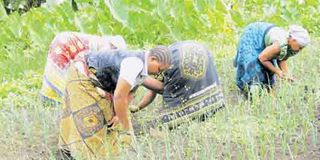Raise agriculture budget, govt urged

What you need to know:
They stress that at 0.85 per cent of the national budget the amount is a far cry from the rate agreed in the Maputo Declaration, which Tanzania is a signatory, to allocate at least 10 per cent of national budgets to agriculture.
Dar es Salaam. The government has been commended for scrapping tax levies in agricultural yields, but experts say the budget is low to promote the sector.
They stress that at 0.85 per cent of the national budget the amount is a far cry from the rate agreed in the Maputo Declaration, which Tanzania is a signatory, to allocate at least 10 per cent of national budgets to agriculture.
“Although the government has scrapped crop levies which affected farmers to a large extent, they are still not protected from natural disasters which could affect their crops,” Agriculture Non-State Actors Forum executive director Mr Audax Rukonge told BusinessWeek.
“The majority of farmers were left destitute when drought persisted because there was no government assistance. We hoped that the government would invest in irrigation infrastructure and stop depending on rain-fed agriculture, but that is not the case.”
He said developed countries offer farm inputs and all necessary facilities to help growers improve crop quality and quantity but in Tanzania the government awaits farmers to complete all procedures on crop production.
What has been done is simply to remove levies.
He stressed that since Tanzania was looking forward to industrialisation by 2020, agriculture was not given its due importance.
However, he hailed the government for injecting Sh209 billion into the Tanzania Agriculture Development Bank (TADB) for lending to farmers.
He said that that was a drop in the ocean as the amount was not only for farmers, but the whole value chain including processors. He urged the government to encourage other commercial banks to provide loans to farmers at an affordable interest rate.
Repoa senior researcher Abel Kinyondo said although the government signed the Maputo Declaration 10 years ago to allocate 10 per cent of its budget to agriculture, it has failed to meet its promise. Instead, the budget has been declining.
He also praised the government for removing unnecessary levies on agriculture yields, but said farm inputs should be subsidised as farmers encounter numerous challenges in accessing fertilisers and improved seeds.
Since most of them get fake seeds and wrong types of fertilisers, yields are poor.
He stressed that 68 per cent of Tanzanians depend on agriculture and to bring in change, the government needed to invest more.
He said the government based most of its resources on industries instead of agriculture that would provide raw materials for factories.
Meanwhile, according to the executive director of the National Network for Smallholder Farmers in Tanzania (Mviwata), Stephen Ruvuga, this year’s budget is not different from last year’s. He said although the government reduced some levies on agriculture yields from 5 per cent to 3 per cent and scrapped others farmers still have to bear the burden of such levies on foodstuffs that are not for commercial purposes.
“We are happy with the government for eliminating such levies that were a great burden to farmers but the budget on development is very low.”
He said that the government had a number of competitive needs of resourcing, but the agriculture needed to be prioritised as it was the backbone of the economy.




